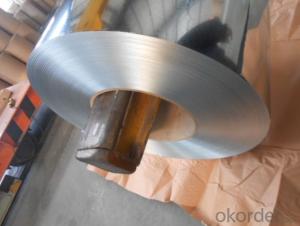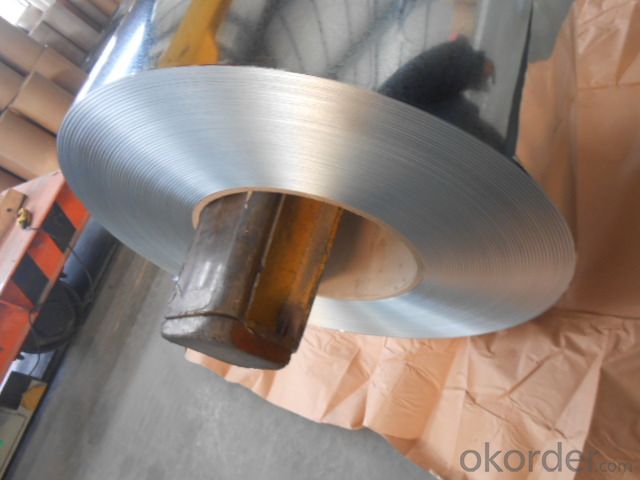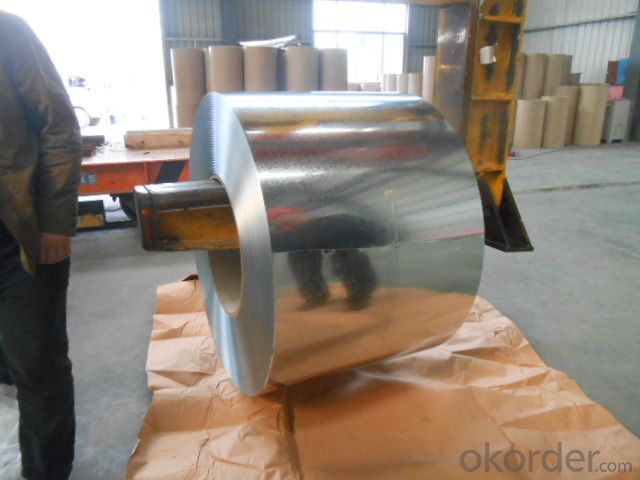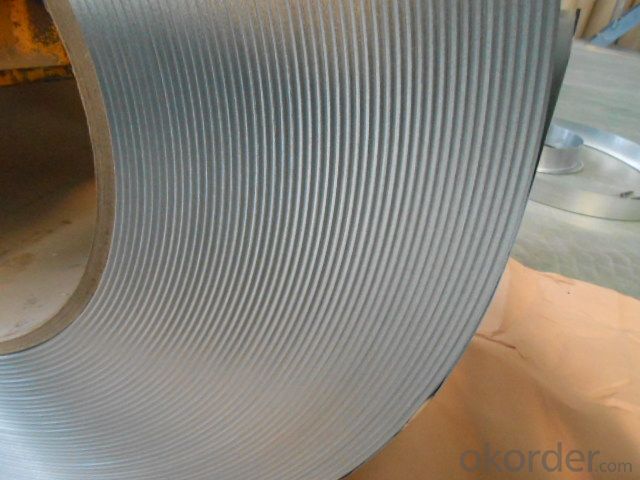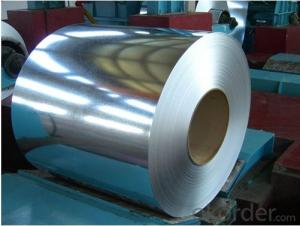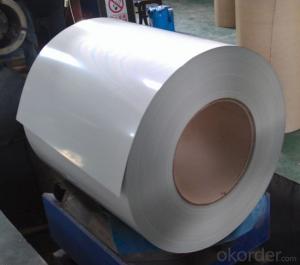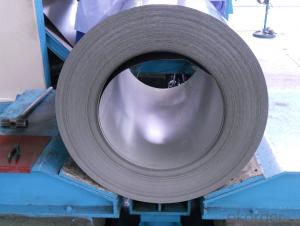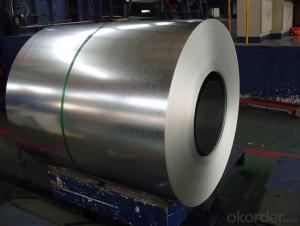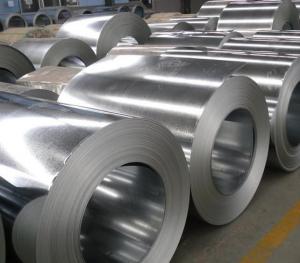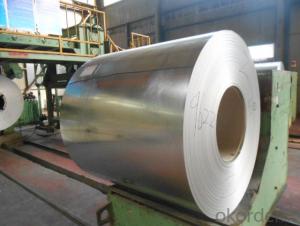GI/HDGI/ zero spangle galvanized steel coil
- Loading Port:
- Qingdao
- Payment Terms:
- TT OR LC
- Min Order Qty:
- 10 m.t.
- Supply Capability:
- 100000 m.t./month
OKorder Service Pledge
OKorder Financial Service
You Might Also Like
Packaging & Delivery
| Packaging Detail: | Standard seaworthy export packing: 3 layers of packing, inside is kraft paper, water plastic film is in the middle and outside GI steel sheet to be covered by steel strips with lock, with inner coil sleeve |
| Delivery Detail: | 30 days after confirming order |
Specifications
GI/HDGI/ zero spangle galvanized steel coil
1.ISO9001 approved
2.High adhesivenees and preciseness
3.Excellent mechanical p
Brief Introduction:
Galvanized Steel Coil gets coated in layers of zinc because rust won't attack this protective metal. The most external layer is all zinc, but successive layers are a mixture of zinc and iron, with an interior of pure steel. These multiple layers are responsible for the amazing property of the metal to withstand corrosion-inducing circumstances. Zinc also protects the steel by acting as a "sacrificial layer." If rust does take hold on the surface of Galvanized Steel Coil, the zinc will get corroded first. This allows the zinc that is spread over the breach or scratch to prevent rust from reaching the steel. For countless outdoor, marine, or industrial applications, Galvanized Steel Coil is an essential fabrication component.
Specification of GI/HDGI/ zero spangle galvanized steel coil:
Material | DX51D |
Standard | EN ASTM JIN |
W.D | 914mm - 1250mm |
Thickness | 0.2mm-1.2mm |
Length | Coil |
Packing | Standard seaworthy export packing |
Payment term | T/T or L/C at sight |
Delivery | Around 30 days after received the L/C according to the quantity |
Tolerance | As the standard required |
Zinc coating | 60-275g/mm2 |
Tensile strength | 270-500n/mm2 |
Elongation | 16-33% |
Coil weight | 4-10MT, According to Clients' requests. |
MOQ | 50Tons |
Productivity | 650,000 Tons per year |
Origin | Zhejiang, China |
Skype | Shirleylu2411 |
Mobile | 86 13706510764 |
More informations, pls feel free to contact me.
Application:
1. Architecture Roofs and outside walls of civilian and industrial buildings, garage doors, fencings and window blinds
2. Appliances Industry Outer clad sheets for washing machine, refrigerator, television, air conditioner and ventilation system, explosion-proof strip, solar water heater and appliance parts
3. Auto Industry Muffler, heat shields of exhaust pipe and catalytic converter, auto parts & accessories under the frame, signboard in highway
4. Industrial Instruments Electric control cabinet, industrial refrigeration equipment, automatic vending machine
- Q: Just wondering how good are forge steel screw drivers, tool boxes(organisers) and pliers are, as screw fix are having a january sale, and looking to add to my tool collection. Thanks in advance
- forged steel is a trick to get people like you who know nothing of steel to think of a blacksmith hammering away at a anvil making great tools. Not to say they are bad they are probably fine. but forged just means it was made when the steel was hot, it says nothing of the quality of steel in the process. however whenever steel is forged it will be stronger than the same product made out the same steel, but shaped by machining process.
- Q: How do the sandpaper grits compare with different coarse levels of steel wool? For example, I'm finishing a homemade entertainment center, and using a tinted polyurethane, and it says to use 000 grade steel wool, but mine is #3, could I use some sanpaper instead, and what grit?
- Steel wool and wax is for the final buff after the finish coat. Sanding will scratch the finish and should only be done before the finish coat. Steel wool and wax have been used as the final finish to remove rough areas and buff the finish for a long time.
- Q: I'm getting microdermals, from a very experienced piercer, but they don't have titanium and I know titanium is the best for this, but is Grade A Srugical Steel okay too?(P.S. also instead of getting flat heads, of the microdermals, I'm getting flat crystal like ones, are those okay? I know to be careful, I am veryyyy careful with my body, so much that I'm worried I'm going to overly do it when I get them and dry out the skin or something hahaa xp)THANK YOU ALL IN ADVANCE FOR THE HELP
- Perfect! 3
- Q: What are the different methods of surface treatment for steel coils?
- Steel coils can undergo various surface treatment methods, each with its own advantages and uses. Some commonly employed techniques include: 1. Hot-dip galvanizing: Immersing the steel coil in molten zinc results in a protective coating. This process offers excellent corrosion resistance and is commonly employed in outdoor applications like roofing, fencing, and automotive parts. 2. Electro-galvanizing: A thin layer of zinc is electroplated onto the steel coil's surface. Electro-galvanizing provides similar corrosion resistance to hot-dip galvanizing but with a thinner coating. It is often utilized when a smooth and visually appealing finish is desired, such as in appliances, electrical equipment, and automotive components. 3. Powder coating: A dry powder is applied to the steel coil's surface and cured under heat to form a durable and protective layer. This method offers excellent resistance to chipping, scratching, and fading, making it suitable for both indoor and outdoor applications. 4. Painting: Liquid paint coatings can be applied to steel coils, offering both protection and aesthetic appeal. These coatings can be customized to meet specific requirements such as corrosion resistance, UV protection, or chemical resistance. They find common usage in industries like construction, automotive, and appliances. 5. Pickling and oiling: This method involves removing scale or rust from the steel coil's surface by dipping it in an acid solution (pickling), followed by a coating of oil to prevent reoxidation. Pickling and oiling are typically employed for temporary corrosion protection during the storage and transportation of steel coils. 6. Pre-painted coatings: Steel coils can be coated with pre-painted finishes during the manufacturing stage. This continuous process involves passing the steel coil through a coating line where a layer of paint is applied. Pre-painted coatings offer a wide range of colors and finishes, making them popular in industries like construction, automotive, and appliances. These are only a few examples of the surface treatment methods commonly used for steel coils. The selection of a specific technique depends on factors such as desired corrosion resistance, aesthetic preferences, environmental conditions, and specific application requirements.
- Q: What are the dimensions of steel coils used in the metalworking tool industry?
- The metalworking tool industry has a wide range of dimensions for steel coils, which can vary depending on the specific application and requirements of the tool. However, there are certain dimensions that are commonly observed in this industry. Steel coils used in metalworking tools typically come in different widths, ranging from 24 inches to 72 inches. The thickness of the coils can also vary, with common thicknesses ranging from 0.020 inches to 0.250 inches. Moreover, the length of the coils can vary significantly, with standard lengths usually falling between 100 feet and 2000 feet or even more. These dimensions are selected based on several factors, such as the type of metal being worked, the specific tool being used, and the desired outcome of the metalworking process. Additionally, other factors like the weight and handling capabilities of the tool, as well as the efficiency of the manufacturing process, may also influence the dimensions of the steel coils used. To ensure the appropriate dimensions for steel coils in the metalworking tool industry, it is essential to consult with manufacturers, suppliers, or industry experts. This is crucial because these dimensions can vary based on specific needs and preferences.
- Q: If steel can rust with saltwater... then why are ships made of steel? can't we just use other metals like aluminium etc?
- Ships are made of steel and also aluminum. Some minesweepers are made from fiberglass. Steel is a comparatively cheap and easily used material. But don't be confused with the type of steel that is used. Plates do not have to be replaced every year. In fact ship s can go for years with no major steel work, and this can be extended with proper maintenance like sand blasting and painting. There are many different steel alloys with different properties. Some of them resist rusting and instead of flaking they just form a powder like barrier. Check out this link.
- Q: This needs to be in a percentage by mass. Could you please also reference where this info has come from. Thanks.
- Steel is almost all elemental Iron (Fe) with a small percentage of carbon (about 0.2 percent) and other alloying metals if required. Iron as in cast iron just has more carbon which lowers the melting point to where it can be cast with lower technology (it was discovered first). Bessemer developed a process to remove most of the carbon and increase the furnace heat, resulting in a tougher metal called steel.
- Q: What are the environmental and social impacts of mining, processing and using steel?
- Without it, you would not have many of the things that you enjoy today. Just think, no cannons, unless they were made of bronze, but that requires mining as well. No computers, no cars, no skate boards, no tall buildings, no pots and pans, no bath tubs, no factories to build things that are made out of non-metallic materials. No stereos, no TVs, no eating utensils, just think, you would have to eat like the Japanese do with bowls and your fingers. In short, just about everything around you is some how made with steel. If you are against steel and feel that it's impact on the ecology of the world is to great, what would you be willing to give up? Your car, ipod, computer, stereo, bed-everything about it uses steel in 0one way or another. Your Cd's, DVDs, just what would you want to give up because, yuck, it was made with steel equipment, or to some extent, made from steel.
- Q: I'm ordering a Pair of tongs(a tool used to dig quahogs in bays that scrapes the bottom constantly) and what type of metal would be the best to fabricate it, steel or stainless steel?
- Stainless Steel is an allow of Chrome and Steel and several other additives. There are at least 100 types of Stainless.. Most common is 300 Series , that the cheapest and used in household stuff. Then there is the 400 series in that series is a stainless that can be heat treated because it contains sufficient carbon to do so. I would say if its wear you are looking for Stainless is not wear resistant to the extent other steels are. You want a heat treatable oil hardenting steel for that purpose. A good example and an old reliable one is what is called O-1 or oil hardening one. It can be heated with a torch at the wear end and quenched in oil right on the fab site. to a hardness of Rockwell C of about 55 or so and wears well. I suppose the best basket would be a 300 Series stainless to reduce rusting with end pieces that are probably bolted on made of O-1 heat treated to RC of about 55 or so. Of course if you make the wear ends removable with bolts, you can really get some wear steels for those wear parts You can use High Speed Steel RC=95, Drills are high speed steel. and even a material called Hasteloy next to carbide in hardeness. I suspect those baskets are made of Stainless Steel with wear ends of another material as ive discussed above.
- Q: What are the different types of steel coil packaging methods?
- There are several types of steel coil packaging methods, including strapping, wrapping, and stacking. Strapping involves using metal or plastic bands to secure the coil and prevent it from unwinding. Wrapping is done by covering the coil with a protective layer, such as plastic or paper, to shield it from moisture and damage. Stacking involves placing multiple coils on top of each other, usually on pallets, to optimize storage space and facilitate transportation.
Send your message to us
GI/HDGI/ zero spangle galvanized steel coil
- Loading Port:
- Qingdao
- Payment Terms:
- TT OR LC
- Min Order Qty:
- 10 m.t.
- Supply Capability:
- 100000 m.t./month
OKorder Service Pledge
OKorder Financial Service
Similar products
Hot products
Hot Searches
Related keywords
